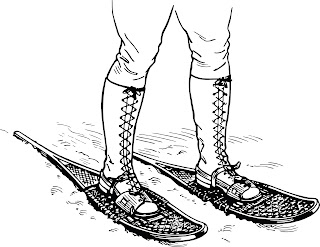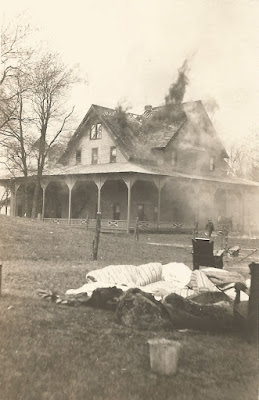In their own words #2 - Frank Bolles, Jr.
Frank Bolles, Jr. was a highly skilled wood engraver from Springfield, MA who owned a small business engaged in creating illustrations for books and magazines. Judging from the number of articles he wrote for the national sporting magazine Forest and Stream, he was a frequent guest at the Fenton House during the 1870s and close personal friend of Charles Fenton. Several of Bolles’ published articles, including the one reproduced here, are literary non-fiction based on stories he was told by Fenton.
Frank Bolles, Jr., “A Snow-Shoe Trip to Albany Lake,”
Forest and Stream, May 6, 1875, Vol. 4, #13, p. 197.
Mr. Fenton, Carter, and Green, the last two from Massachusetts, took a fishing trip on snow-shoes to Albany Lake, March 10. Thinking it might be interesting to brother sportsmen, I give you Mr. Fenton’s account of the trip. Mr. Carter has been stopping at the Fenton House, No. 4, all winter, and has spent most of the time tramping about hunting and trapping, and had [the] required nerve and muscle, rendering him a fit companion for the trip. Mr. Green, however, had been indoors all winter, unused to manual labor, and had never used snow-shoes, consequently it told pretty hard on him, and caused a good deal of fun at his expense. But he determined to try it, so they started for the lake, which is twenty-five miles from the Fenton House.
Mr. Fenton says: We were provided with a sled made narrow, so as to run in a snow-shoe track, on which we tied our supplies for the trip. We did not take any dishes or culinary utensils, as I had two years ago hid a whole camp kit at the lake. We started at 11 o’clock. Now it was that the fun commenced. I do not know but what it was wrong to laugh at the misfortunes of others, but it was impossible to keep a sober face, as our portly friend G. made his first attempt on snow-shoes. Although he spread his feet twice as far apart as was necessary, he would often lock the heels of his snow-shoes together, and after one or two convulsive efforts to extract them, he would describe an arc forward, and with a fearful plunge disappear in the deep snow, from which dilemma we would have to extricate him and again set him on his feet, only to go through the same performance every few rods [1 rod = 16.5 feet]. We took our turns drawing the sled, each one drawing it about a mile at a time. Friend G. took his turn, although it was a great effort for him to do so, causing the perspiration to drop from his face like rain. He finally excited our sympathy so much that towards night we drew the sled ourselves, as he became very much exhausted and I began to doubt his ability to reach Wardwell’s, our stopping place for the first night, but we finally reached the house, G. being nearly used up. (Wardwell’s is eleven miles from the Fenton House). As we had about an hour of daylight, C. and myself went up the river for fish bait. We were successful, and caught all the minnows we wanted.
Mr. Wardwell is wintering at Stillwater. His family consists of his wife and mother, an old lady of about seventy years. Wardwell has had no communication with the outside world since the first of January, except by snow-shoes and as we were his first guests we were kindly cared for.
The following morning, after breakfasting on beefsteak, which our host acknowledged was not of the first cut, (but I am sure he must be mistaken, for I believe it was the first cut below the horns), we added to our sled supplies sixteen pounds of flour and a small sheet-iron stove, which I had at Wardwell’s, and bidding adieu to our friends we started up the road. The additional weight to our sled caused it to draw much harder than it did the previous day, and it was with many groans and expressions of disliked to this kind of locomotion that friend G. started off this morning to renew the performance of yesterday with his snow-shoes. He was so all used up that he made no attempt to draw the sled today, and therefore C. and myself were obliged to draw it all the way. About noon we arrived at the old log cabin of Chauncey Smith, at the South Branch. We halted here long enough to eat a few crackers, and again started for our place of destination and reached the foot of Albany Lake about three o’clock P.M. Here we found a small log cabin made a few years ago by a trapper. It was a low, mean looking shanty, but as there was no prospect of finding anything further up the lake, we resolved to camp here. The snow was even with the top of the shanty and there was no door visible, so I set to work to see if I could find one. After an hour’s work digging snow, I was able to open the door and take a peep inside. I can assure you it did not look very inviting. It was almost a foot high at the back and rose to about six feet high in the front. The chimney was open, and there was about three feet of snow in the fireplace. I threw out some of it, and placing my stove on the snow and ice I soon had a good fire, which caused things to look more cheerful. After preparing plenty of wood for the night we crawled in and took a good look at the inside, to see if we could be comfortable in such poor quarters.
To me it looked very cozy, but my friends, to whom this was their first camping trip out in Winter, looked rather glum. Poor G. was completely played out, clothes wet and generally demoralized. There was nearly a foot of snow and ice on each side of the stove which had to be melted away, and to add to our discomfort we had no chance to do any cooking, and no dishes except the tea pot. In this we made some tea, and with a little bread and butter contrived to stay our hunger, and turned in for the night. I should have enjoyed a good night’s sleep but for the grumbling of my comrades, who were cold, wet, and generally uncomfortable, for as the stove warmed up the cabin the water began to run in all directions. But morning dawned it last, and we arose stiff in every joint, but oh, so hungry – and had to again try bread and butter and tea. But we expect to be all right as soon as I find my cooking utensils, which I had secreted further up the lake.
The weather to-day was unfortunate for fishing, as the wind blowed [sic] most fearfully, with some snow falling; but not withstanding the storm we had a splendid day’s fishing. I caught 19 salmon trout, weighing from 2 to 5 pounds each. C. caught two and G. six, one of them weighing about 8 pounds. The only drawback we had today was the failure to find the cooking utensils I had hidden so carefully, leaving no land marks, and the deep snow had so changed the looks of things that I was unable to find them. Our prospect for supper now looked gloomy indeed. We ate the last of our bread in the morning and our provisions now consisted only of flour, pork, and maple sugar and fish, with nothing to cook them in.
“What shall we have for supper?” said C.
“Flour sir, nothing but flour.”
“Well,” says G., “this is the first time I was ever in the woods without any show of comfort; nothing to eat, and no decent place to sleep, and I’m going to dig out of this to-morrow morning.”
“I had thought,” said C., “ever since I came to the Fenton House, that I should like a winter trip in the woods, but if this is the kind of hardship and privations one has to endure, I have enough of fishing in the winter. Here I have been on the point of starvation for the past two days, nothing to eat but bread and crackers, (which I always did dislike) and now we are down to flour for the rest of the trip. I can’t stand it much longer.”
Now this talk was fun for me. “I aint going to starve boys,” said I, “as long as we’ve got pork and flour, so stop grumbling; we’ll get along some way.”
Arriving at the shanty, I told them every man must cook his own supper.
“We can’t,” said they, “we have nothing to cook in.”
Lying on the ground was an old pint cup that some trapper had thrown away as worthless. I picked it up and scraping the rust from it with a knife, I saw it was tight enough to hold water.
“Now I have something to make pancakes in,” said I.
“You don’t mean to mix pancakes in that do you?” said both.
“Certainly,” said I, “a little oxide of iron is a good tonic, and will strengthen you for your trip to-morrow.”
“But how will you bake them?” they exclaimed, looking around; “there’s nothing here to cook in.”
“Well enough,” said I, at the same time inverting the pint cup of batter and turning the contents on the stove. My companions looked at me in mute astonishment, and began to smile at the prospect of pancakes for supper; but when the cakes were cooked, their keen appetites overcame all scruples about the rust and manner of cooking, for when served up with maple sugar they rapidly disappeared.
 |
| Charles Fenton |
The following day there came on a thaw and covered the ice with water, which made it uncomfortable fishing; besides the fish do not bite well when snow water is running. The snow had become so soft that it was impossible to walk on snow-shoes, so we were obliged to remain until it should freeze up, which it did so on the night of the 16th, and the next morning we put our fish, about 60 pounds in weight, into a bag and tying it to the sled started for home.
When within 5 miles of the Fenton House, in making a turn in the road, two figures appeared in the distance approaching us. There was no mistaking W’s slow and lazy gait, but the other seemed to be the figure of a female. Could it be, and the snow four feet deep! On a nearer approach we saw it was Miss Rosa Wardwell on snow-shoes. She was in advance of her father, while he seemed to be doing his best to keep up with her. She had been to school all winter, and was just returning home on a vacation. I have since been informed that she walked from No. 4 to Stillwater, eleven miles, in three and a half hours without being the least fatigued. Think of that, ye city girls. We arrived home about sundown, having walked and drawn our sled twenty-five miles.






YOU GO, ROSA!
ReplyDelete